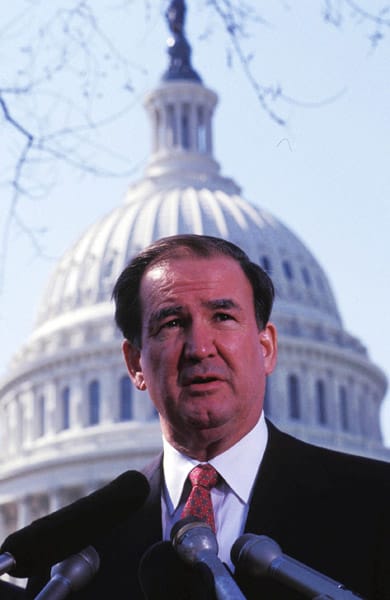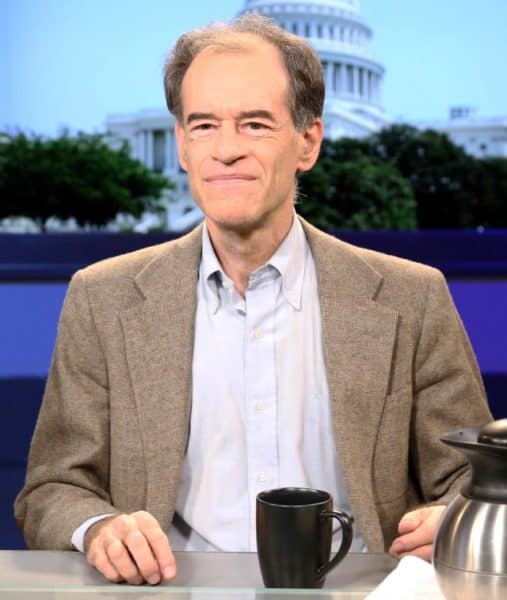Convincing the Conservatives
Jared Taylor, American Renaissance, November 2002

Credit Image: © Globe Photos/ZUMAPRESS.com
Patrick James Buchanan, conservative columnist, television personality, and three-time candidate for President, heads a 501(c)3 educational foundation called The American Cause. The foundation sponsors occasional debates in which it tries to “match the brightest minds in the business to the most critical issues of our day.” On October 4 and 5 in Arlington, Virginia, it held what it called “The Great Debate,” the first in what will be an annual discussion of immigration. All participants in the debate were to be “conservatives,” in an attempt to arrive at a better common understanding. Your servant was not invited to speak, but attended as part of an audience of approximately one hundred. Questions were not taken from the floor but were collected on note cards, so it was not possible to needle panelists directly.
If this debate is any guide, conservatism is indeed a house of many mansions. There were a few stout-hearted restrictionists such as Sam Francis, Peter Brimelow, Don Feder, and Mr. Buchanan himself, but there were not a few libertarians prepared to throw open the gates to all who want to come. Given that a consistent 60 to 70 percent of Americans favor reducing immigration, it is edifying to note how many “conservative” commentators and opinion-makers flout the public will. “The Great Debate” reinforced the view that the purpose of a college education is to give Americans the right attitudes towards immigrants and the means to live as far away from them as possible.
The debate took the form of several panels, the first of which was a discussion of whether mass immigration is good or bad for the economy. George Borjas, who teaches economics at Harvard’s John F. Kennedy School of Government, noted that the inevitable effect of adding workers to the economy is that wages fall — but only in those professions filled by immigrants. Since most are unskilled laborers, it is laborers already in the United States whose wages fall. Prof. Borjas said that as a rule, every 10 percent rise in the number of workers in a field reduces wages by about three percent. If we were importing journalists or lawyers or doctors, it is in those professions that we would see downward pressure on wages.
Who benefits from lower wages for manual laborers? The people who hire them.
However anyone who is not a laborer is likely to benefit because some portion of the savings from lower wages is passed on to consumers. Prof. Borjas concludes that there is a net increase in national wealth due to immigration of about $10 billion a year, or about $30 per American. This is a very small gain, given the size of the US economy, and does not include non-wage-related costs such as higher crime rates among Hispanics, the costs of courtroom and hospital interpreters, bilingual education, medical treatment for uninsured immigrants, etc. Prof. Borjas says that when all these costs are subtracted from the $10 billion gain, some economists figure that the real net economic result of immigration is a loss of $70 billion a year. This is still a small figure compared to our national GNP, but the cost is not evenly distributed. According to some estimates, every California household pays, on average, an extra $1,300 a year in taxes because of immigrants.
Prof. Borjas reminded the audience that immigration raises a host of non-economic problems. As the Germans say about the Turkish Gastarbeiter: “We wanted workers but we got people.” Now that 10 percent of the population of Mexico has moved to the United States, we too are dealing with people rather than workers, who are gathering in enclaves that make assimilation impossible. Prof. Borjas also pointed out that it is false to claim we need immigrants because natives refuse to take certain jobs. It is all a question of wages. In those parts of the country where there are few immigrants, natives can always be found to mow lawns and wait tables, though the wage may be higher than in Miami or Los Angeles. Prof. Borjas also noted that today there are so many immigrants they can influence immigration-related political decisions in ways that suit them rather than natives.

Dan Griswold (Credit Image: Gage Skidmore / Flickr)
Dan Griswold is with the libertarian Cato Institute and disputed even the idea that there is mass immigration. He said only 10 percent of Americans are foreign born, and that there have been times in the past when the figure was higher. Mexican immigration is “considerably exaggerated,” he said, since in terms of the existing national population at the time, there have been even larger flows of German and Irish immigrants. In his view, immigration makes America “more productive at home and more influential in the world.” He argued that without immigrant service workers “you couldn’t afford to hold this conference,” and insisted that high levels of immigration are associated with high economic growth. He conceded that high school dropouts are hurt by competition from immigrants but said the answer is better education, not a reduction in immigration since there is a “pervasive need” for labor. He also insisted that a large population will ensure American influence in world affairs, and that the money immigrants send out of the country is “a hidden blessing” because it does so much good back home. He also disputed the view that Mexicans are creating enclaves, because they are now moving everywhere. He said an increasing population cannot be a threat to the environment because our air is now cleaner than it was 20 years ago, and because the United States is much less densely populated than Europe. Mr. Griswold was asked if immigration should continue until no one wants to come, in other words, until conditions in the United States are as unpleasant as the worst parts of the Third World. He said, in effect, yes, that until the 1920s there were no limits on immigration, and free markets saw to it that immigrants went where they would be most productive.
Peter Brimelow, who edits VDARE.com, disputed Mr. Griswold’s view, saying it was naïve to pretend that more than a million newcomers a year were not “mass immigration.” He also noted that even immigration proponents agree that the net economic benefit for the country is small and that this means “our country is being transformed for nothing.” He agreed with Prof. Borjas that many natives are willing to do manual labor but are priced out of the market by immigrants who work for Third-World wages.

Peter Brimelow
Mr. Brimelow pointed out that there are many non-economic effects of immigration, and that by importing poverty, disease, illiteracy, and crime we have ensured that “there is an immigration dimension to every social problem.” He also argued that American handout programs ensure that low-skill immigrants will keep coming even if there is no need for them, since life in America on welfare is better than being a peasant in Mexico or Nicaragua. He said that if there were as many skilled as unskilled immigrants coming to the United States, the elites who champion immigration would oppose it because it would threaten their jobs. He also noted that contrary to Mr. Griswold’s contention that the environment is unaffected by immigration, a growing population means overcrowding and sprawl. He concluded that the most important consideration is whether the United States has the right to exist as a nation, in which its people see themselves as an extended family that puts its interests ahead of those of strangers and foreigners. Net economic effects are of minor importance compared to this central question.
Alexander Tabarrok, who teaches economics at George Mason University in Virginia, claimed that most economists agree that immigration is good for the economy, and that more would be better. He said that even if immigrants push down the wages of a few native laborers, we should be happy because the benefits to the immigrants are so great. He said welcoming them expresses “the Christian ethic of kindness to strangers,” and that since immigrants are good for the economy, immigration gives us a chance “to do right and do good at the same time.” Immigration is “a humanitarian, ethical, and moral issue,” so caring people should want more of it. Mr. Tabarrok said technology destroys far more jobs than immigration does, so if preserving jobs is our concern we should oppose science. He also said immigration to America is good for the world environment because once they are here, Third-Worlders are less likely to engage in such things as slash-and-burn agriculture.
The first panel on Saturday debated the question: “Does Balkanization Loom?” Former Boston Herald columnist Don Feder opened with a firm “yes.” “I am filled with fear for the future of my country,” he said, adding that current immigration threatens national identity and is like “playing Russian roulette with your country.” He would support a five-year halt to immigration, with troops on the border if necessary. As for those who are already in the country, “if they came here illegally, we owe them absolutely nothing.” He would encourage sweeps of illegals and finds it “appalling” that self-styled “conservatives” would have any hesitation about enforcing immigration law. If there is to be any immigration at all, immigrants should be “like us” rather than the Third-World grab-bag we are currently getting, and he is completely opposed to Muslim immigration. He said schools must once again teach assimilation rather than ethnic separation, which he described as “social dynamite,” and that before long there would be so many immigrants they could dictate immigration policy. Mr. Feder was the stoutest speaker of the day, and was warmly received by what was clearly a restrictionist audience.
Ron Unz, a wealthy businessman who has organized ballot initiatives in California and elsewhere to do away with bilingual education, favors current levels of immigration so long as there is assimilation. He said that as a result of the “landslide” victory in California of Proposition 227, bilingual education — which is usually Spanish-only education — has declined by 80 percent. As a result, he said, the test scores of Hispanics are climbing rapidly. Mr. Unz claims that Hispanics themselves want immersion in English because they understand that without English they cannot succeed in America. This claim was somewhat undercut by the fact that in California more than 60 percent of Hispanics voted against Proposition 227, and it is safe to assume that naturalized Hispanics who can vote probably favor English instruction more than do recent arrivals who are less likely to speak English. Mr. Unz said that even liberals now understand the importance of teaching English to Hispanics, and claimed that the last bastions of support for bilingual instruction aside from Hispanic activists are Republicans in the Senate who think they are wooing Hispanic voters by continuing bilingual programs. Mr. Unz did concede that mass immigration could pose a theoretical threat to national unity, and said that if he became convinced the threat were real he would agree to reductions. He said he would oppose systematic deportation of illegals.

Ron Unz
Ramesh Ponuru, a dark-skinned Indian who is a senior editor at National Review, conceded that “Balkanization is a threat,” but thinks current immigrants will assimilate. He opposes multiculturalism because it diverts loyalty from the nation to the ethnic group and is therefore anti-democratic. He said immigration at the current level can be maintained, but that it will take considerable effort to assimilate the newcomers. Assimilation would be easier if there were fewer to assimilate, and he would reduce the intake to about 300 or 400 thousand a year. Theoretically, it might be possible to be more discriminating about which immigrants we accept, but he says as a practical matter we cannot do this, and must reduce numbers across the board. He said he had no principled reason to oppose rounding up and deporting illegals, but said there were too many practical problems for it to work.
Linda Chavez, who is president of the Center for Equal Opportunity, said English is at the heart of American culture, and that it must be taught to newcomers without exception. She is relatively optimistic about assimilation, claiming that Hispanics who have been here for three generations are fully assimilated, with one third to one half marrying whites. She would abolish affirmative action and birth-right citizenship, and put an end to “family reunification,” since immigration should be in our interests rather than in those of the immigrants. She even conceded that we now have too many immigrants from Mexico and other Spanish-speaking countries. She blamed the white majority for permitting multiculturalism. She would not commit to a suitable number for immigration levels, saying only that they should rise and fall according to economic demand for workers. Miss Chavez proposed a guest-worker program that would provide labor only when it was needed, but conceded this would require much better INS supervision. She would be prepared to exclude Muslims almost completely, and to cut back on all Spanish-speakers. Although she claimed not to support amnesty, she opposed the idea of a concerted effort to deport illegals, saying it would be impractical and lead to abuses. She called for strong control of the border — though not with troops — but would deport only those illegals who commit crimes.
This panel was followed by one on the question of whether open borders are an invitation to terrorism. Panelists were Filipina-American columnist Michelle Malkin, former Deputy Commissioner of the INS Ricardo Inzunza, editor of Human Events Terry Jeffrey, and Steven Camarota of the Center for Immigration Studies. They took different approaches to the question, but all agreed on the obvious: that porous borders make it easier for terrorists to enter the country, and that large numbers of Third-Worlders give them a context in which to operate without calling attention to themselves.

Michelle Malkin (Credit Image: Gage Skidmore / Wikimedia)
Patrick Buchanan spoke next, and gave a summary of his excellent book, The Death of the West. He said there have been translations into Russian, Spanish, German, Japanese, and Chinese.
The final panel discussed the question: Will mass immigration kill the GOP? Since this was a “conservative” gathering, all panelists were assumed to think this would be a bad thing, but columnist and frequent AR contributor Samuel Francis reaffirmed his contempt for what he calls “the stupid party” by answering, “I rather hope so.” He then produced a blizzard of statistics showing the consistently dismal returns Republicans have earned on all their “outreach” to Hispanics. The high-water mark for Republicans was George W. Bush’s reelection as governor of Texas in 1998, when thanks to “sedulous cultivation and pandering, and opposition to the end of bilingual education,” he managed to get 40 percent of the Hispanic vote. Mr. Francis pointed out that Mr. Bush lost the Hispanic vote 69 percent to 31 percent in 2000, and that only 28 percent of Hispanics supported him in California, the bellwether state with the most Hispanic voters. Bob Dole and Jack Kemp also truckled to Hispanics only to be abandoned at the polls. Mr. Francis pointed out that Hispanics consistently tell pollsters they want more government services, and argued that the Republicans cannot woo them away from the Democrats without ceasing to be Republicans and thereby alienating their white base. Whatever absurd offers Republicans make to immigrants will be matched and raised by Democrats. “Republicans,” he concluded, “face extinction at the hands of immigrants they have permitted to enter the country.”
Michael Barone, a senior writer for U.S. News and World Report, argued the pro-immigration side by maintaining that new immigrants will assimilate just as European ethnics did, that George W. Bush will win over the Hispanics, and that Hispanics don’t really vote overwhelmingly for Democrats anyway. He said they will not vote for big government and handouts because they are suspicious of their own governments, and because where they come from there is no welfare. “They have a real work and family ethic,” he said, and are not interested in uplift. He said only a handful of fanatic Mexican academics support the Aztlan movement, and that Asians will vote GOP with as much enthusiasm as whites. Anyway, America’s racial problems will be washed away in a warm bath of miscegenation. “My great wish,” he said, “is that 50 years from now we will be so mixed there will be no more racial categories.”
Steven Moore is president of the Club for Growth and a senior fellow at the Cato Institute. He began by saying it was “divine providence” that established the United States as a “sanctuary to oppressed people around the globe.” He says immigrants create jobs, that they have been “expertly assimilated,” and that the United States dominates high-tech industries because so many wonderful foreigners have come to live here in what is “a reverse form of foreign aid.” He said all “conservative free-market Republicans” believe that immigration has been a great blessing and will continue to be one. He said if Republicans campaign against immigration they will never win another election, and that if the choice is between doing away with immigrants or the Republicans, he would keep the immigrants. “We are constantly reinvigorating ourselves with this new blood,” he added, and, like Mr. Barone, said he believes miscegenation will eventually solve all racial problems.
Patrick Buchanan argued that because of immigration and low white birth-rates, “the natural base of the Republican party is shrinking and dying out.” The Cold War no longer needs to be fought, and not even social conservatism can rally much support. He said Republican strategists like Karl Rove think dwindling whites can be replaced with Hispanics, but this is folly. Poor Hispanic immigrants do not pay taxes, so do not care about eliminating the inheritance tax or lowering tax rates. They will vote for the party that offers the most benefits.
Mr. Buchanan pointed out that in the 2000 Presidential election, Al Gore won six of the seven states with the most immigrants, and George Bush won 14 of the 15 states with the fewest immigrants. He noted that California used to vote Republican but predicts the GOP can no longer win state-wide races. He added that the party might be able to appeal to Catholic Hispanics by opposing abortion and special rights for homosexuals, but is too craven to try. Echoing Mr. Francis, he said Republicans “are happily importing an electorate that will vote it out of existence.” Mr. Buchanan predicts that in 20 or 30 years the United States will have openly racial parties for blacks, Hispanics, and perhaps even whites, with a sprinkling of fringe parties with ideologies that cross racial lines.
So ended “The Great Debate.” As one would expect at an event hosted by Mr. Buchanan’s organization, the audience was considerably more exclusionist than most of the panelists. Many in the audience were AR readers, and those who were not were pleased to see sample issues. The meeting only confirmed the impression that as increasing numbers of whites come to their senses, media and intellectuals continue to stumble along in the dark. A presumably democratic country cannot go on forever with such a stark difference between public opinion and published opinion.















